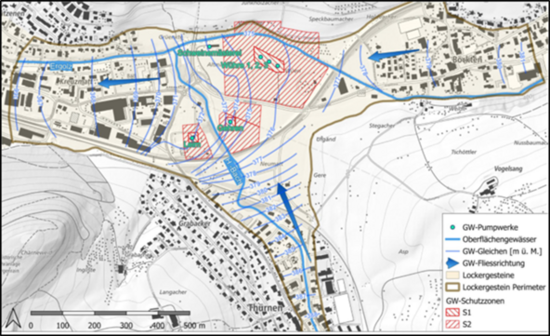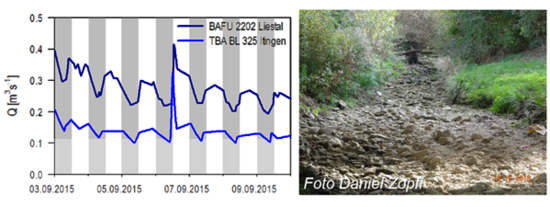Sustainable management of groundwater resources
Annette Affolter, Stefan Scheidler & Jannis Epting
Groundwater is one of the most important resources for industry, agriculture and the production of drinking water. A prerequisite for sustainable groundwater protection is the understanding of the various processes of groundwater recharge and the emergence of groundwater quality.
Results from hydrogeological investigations form the basis for the assessment of hydraulic engineering measures and the regional management of water resources. A reconciliation of different interests with the protection of groundwater also includes the restoration of rivers in their function as species-rich ecosystems that shape landscapes and connect different habitats with each other.
Groundwater models are a valuable tool to determine or estimate, based on hydrological and hydrogeological data and operating data, inflow areas of drinking water wells. Scenario development can be used to record the possible effects of encroachments or natural hazards and to perform appropriate risk and risk assessments.
![[Translate to English:] nbg](https://duw.unibas.ch/fileadmin/_processed_/2/a/csm_Nachhaltige_Bewirtschaftung_Grundwasserressourcen_a2f390df04.png?1752055251)
Figure: Left: Groundwater regime and inflow areas of the drinking water wells in the lower Birsvalley between Aesch and Reinach, Switzerland. Bottom right: Cross section through the aquifer and monitoring systems to study river-groundwater interaction in the inflow of a drinking water well (Epting, J., Huggenberger, P., Radny, D., Hammes, F., Hollender, J., Page, R.M., Weber, S., Banninger, D. and Auckenthaler, A. (2018) Spatiotemporal scales of river-groundwater interaction - The role of local interaction processes and regional groundwater regimes. Science of the total Environment 618; https://doi.org/10.1016/j.scitotenv.2017.09.219).
Managed Aquifer Recharge (MAR) und Managed Surface Water Recharge (MSWR)
Longer drought periods, increasing water demand, and growing conflicts between drinking water supply, water protection, and ecological requirements are placing increasing pressure on the management of groundwater and surface water resources. In valley aquifers with strong hydraulic connectivity between rivers and groundwater, abstractions, artificial recharge, and operational controls can substantially affect river discharge during low-flow conditions (Figure 1). At the same time, measures such as Managed Aquifer Recharge (MAR) and Managed Surface Water Recharge (MSWR) are gaining importance as tools to stabilize water availability, ecological functions, and supply security in the long term. However, the targeted implementation of such measures requires a detailed understanding of local river-groundwater interactions and the temporal response of the system to operational interventions.
At the Wühre pilot site (Sissach, Ergolz catchment; Figure 1), the impacts of groundwater abstraction on low-flow conditions in the Ergolz River are being investigated. During dry periods, pumping from the drinking water wells Wühre 1-3, located close to the river, can significantly aggravate low-flow conditions. Since 2025, a new control system implemented by the Sissach water utility has enabled optimized pumping strategies. Based on an already calibrated groundwater flow model, a targeted field experiment during a low-flow period is planned to quantitatively assess the effects of different pumping strategies on river discharge and groundwater levels, and to further optimize operation.
In the Frenke catchment (Niederdorf-Hölstein; Figure 1), the focus is on artificial groundwater recharge of the valley aquifer. A comprehensive monitoring and modeling framework investigates how infiltrated water from the ARA Frenke II site influences groundwater dynamics and the discharge of the Vordere Frenke. Model results indicate that even moderate recharge rates can make a relevant contribution to low-flow discharge. In addition, the Helgenweid site is being evaluated for measures to enhance groundwater exfiltration into the Frenke, for example by directly discharging groundwater into the river during dry-weather conditions. Planned field experiments will quantify the hydrological effects of this measure and assess its suitability as an adaptation strategy for low-flow conditions.
Commissioned by: AIB & AUE BL
Project duration: 2023-2026
Annette Affolter, Stefan Scheidler & Jannis Epting


Figure 1: Above: Groundwater flow regime in the Wüeri area east of Sissach, including drinking water wells and groundwater protection zones (BSc Hollinger 2024). Bottom left: Influence of the pumping regime (at night: grey) of drinking water wells on the Ergolz water level. Bottom right: Drying up of the Ergolz above Sissach in autumn 2018.
BSc-Arbeit Holinger J (2024): «Hydrogeologie - Konzepte für MAR»

Figure 2: Left: Vordere Frenke and Niederdorf wastewater treatment plant. Right: Various MAR concepts (modified according to Dillon (2005)).
Dillon P (2005) Future management of aquifer recharge. Hydrogeology Journal, 13(1), 313–316. https://doi.org/10.1007/s10040-004-0413-6
Quick Links
Social Media
